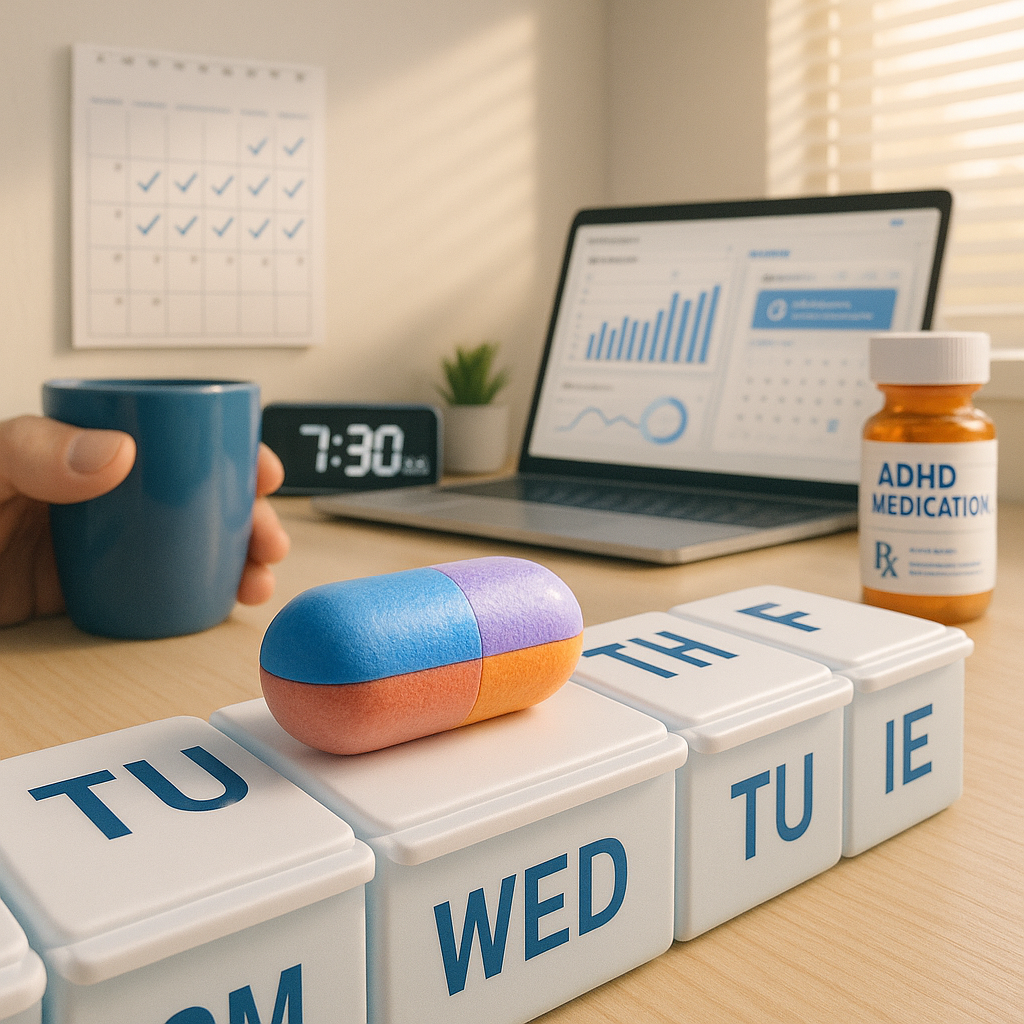Key Takeaways
- Final-stage clinical trial underway: Cingulate’s ADHD pill is currently in Phase 3 trials, a crucial step before potential FDA approval.
- Once-daily dosage streamlines routines: The medication is designed to ease treatment for adults who struggle to remember multiple daily doses.
- Potential for more ADHD-friendly management: If approved, the drug could provide a treatment option that reduces the need for frequent scheduling.
- FDA decision anticipated by late 2024: Cingulate aims to submit results within months, with an approval decision targeted for year-end.
Introduction
Cingulate’s once-daily ADHD pill has entered final-stage clinical trials, moving the Kansas biotech’s streamlined medication closer to FDA approval in the United States. The advancement, announced Monday, could provide a simpler, more ADHD-friendly option for adults managing multiple doses. This means potential changes to daily routines for neurodivergent professionals as early as late 2024.
What Cingulate’s Once-Daily ADHD Pill Promises
Cingulate’s new ADHD medication offers something many adults have hoped for: true once-daily dosing that maintains effectiveness throughout the day. The pill uses proprietary triple-release technology called CTx, which delivers medication in three distinct phases. This approach eliminates the need for multiple doses each day.
By staying active from morning through evening, the medication tackles challenges adults face with medication management. Traditional ADHD treatments often require two or three doses daily, creating medication gaps that can disrupt work performance, evening responsibilities, and daily routines.
Dr. Maya Collins, a neuropsychologist specializing in adult ADHD, points out that remembering to take multiple doses is an executive function task. Many adults with ADHD find this particularly challenging. For them, the pill’s design offers a real-world solution to adherence barriers.
Cingulate’s approach leans into practical functionality, matching contemporary views of ADHD as a difference in executive function, not just a deficit.
Progress Toward FDA Approval
Cingulate announced this week that its once-daily ADHD medication, CTx-1301, has advanced to Phase 3 clinical trials. This stage is the final major testing phase before FDA submission. The company reported that prior trials showed promising results for symptom management and a safety profile similar to existing ADHD medications.
Phase 3 will involve about 400 adult participants at sites across the United States. Researchers will evaluate the medication’s ability to provide consistent coverage throughout the waking day, setting it apart from other options.
Shane J. Schaffer, Cingulate’s CEO, called the move to Phase 3 a significant milestone for the ADHD community. He emphasized the medication’s design to address the real-world challenges adults encounter in managing ADHD.
Industry analysts suggest that, if Phase 3 results are positive, FDA approval could occur by late 2024 or early 2025. Of course, regulatory timelines can vary.
How the Technology Works
The CTx technology platform delivers medication in three precisely timed phases, all with a single pill. The first phase activates immediately, providing morning relief. The subsequent phases release at set intervals, helping avoid the peaks and valleys often reported with traditional medications.
This system attacks the “wearing-off” problem many ADHD adults experience. Consistent medication coverage aims to support executive function during key transitions, like late afternoons when work and home responsibilities often overlap.
Dr. James Richardson, a neuropharmacologist at Boston Medical Center, explained that the main challenge with current medications isn’t just their effectiveness, but maintaining it consistently throughout the day. The new approach could improve the quality of life for many adults.
Additionally, the technology includes abuse-deterrent features to address concerns about stimulant misuse while keeping treatment accessible for those who need it.
What This Means for ADHD Adults
For adults managing ADHD, a once-daily medication could simplify routines and possibly improve treatment adherence. Consistent symptom management addresses a frequent concern with multiple daily dosing.
The pill’s design is especially helpful for adults with unpredictable schedules, caregiving roles, or work environments where midday dosing just isn’t practical. Not needing to remember those extra doses removes both practical and social hurdles to treatment.
Alex Martínez, an IT professional diagnosed with ADHD as an adult, shared that forgetting midday medication often disrupts productivity and symptom control. This innovation might address similar issues for many others.
Patient advocacy groups have responded positively, emphasizing the importance of medications that meet real-world needs for people living with ADHD.
Potential Impact on Daily Functioning
Consistent coverage from Cingulate’s medication could make a real difference in areas where ADHD adults often struggle, such as time management, task transitions, and evening responsibilities. These are areas where the old medication schedules often fall short.
Work performance could improve, especially during late-afternoon tasks and meetings, when traditional medications often wear off. Evening family duties and handling the house might also become more manageable with extended symptom coverage.
Dr. Collins observed that afternoon transitions are a common time for symptom resurgence, leading to stress and difficulties in shifting gears from work to home life. The pill’s development highlights a move toward broader life support, not just workplace or academic focus.
Timeline and Availability Expectations
Cingulate expects Phase 3 trials to conclude in about 12 to 18 months. If results are positive, the company plans to submit a New Drug Application to the FDA by mid-2024.
Regulatory review typically takes 10 to 12 months. This could bring the medication to market by late 2025 if approved. Cingulate has already begun manufacturing preparations to support rapid rollout if approval comes through.
Insurance coverage and accessibility will also matter. The company says it is committed to working with insurers for favorable formulary placement, but pricing details haven’t been released yet.
Schaffer stressed that innovation is only meaningful when people can access it. Cingulate is developing supportive programs alongside the medication.
Conclusion
Cingulate’s once-daily ADHD pill could reshape routines for adults seeking reliable symptom coverage without the challenge of multiple daily doses. The innovation reflects a turn toward real-world solutions and executive function support. What to watch: Results from the Phase 3 clinical trial and Cingulate’s upcoming FDA submission, expected by mid-2024, as these will determine the medication’s path to market.





Leave a Reply